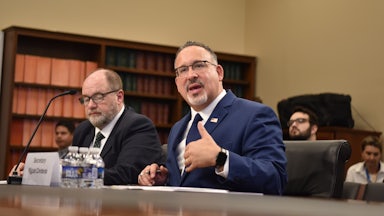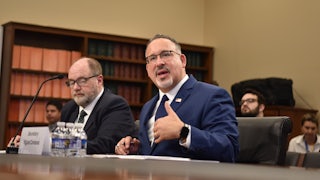As the authorities worked to clear the Capitol of rioters last week, the Associated Press called Georgia’s remaining Senate runoff race for Jon Ossoff, confirming that Democrats would be entering the Biden administration with full control of Congress. After a disappointing election night in November, organizers in Georgia had delivered the outcome progressive activists and policymakers had spent the entire Trump era pining for and working toward. But the first weeks and months of Biden’s term, like Ossoff’s victory, are sure to be colored by the Trump administration’s dramatic close. And the January 6 attack on Congress and the democratic process will give an extraordinary new resonance to the looming push for democratic reforms like the elimination of the Senate filibuster via the nuclear option—a vote from Senate Democrats that would make it possible to pass ordinary legislation with simple majorities rather than the 60-vote threshold the filibuster effectively imposes.
Ezra Levin, co-founder of Indivisible, is among the activists hoping that what happened at the Capitol underlines the stakes of reform for Democratic lawmakers. “I do hope that if you were at all on the fence before January 6,” he told The New Republic in an interview, “the events of the last week have proven to you that the institutionalist position is not the status quo—that the status quo is untenable. If you want to maintain the republic, the only option is to pass reforms to ensure that our democracy can continue.”
Those reforms include a full restoration of the Voting Rights Act that would expand the franchise and protect it from conservative voter suppression; statehood for the District of Columbia; and expanding a Supreme Court now dominated by a conservative majority won by a conservative minority in this country, whose structural power is only growing, thanks to the design of our federal election processes and major political institutions. But none of these proposals will come to fruition unless the legislative filibuster is eliminated, a move major Democrats, including President-elect Biden, greet with ambivalence or oppose outright.
Fortunately, there is a plan. After President Trump’s victory in 2016, Levin; his wife, Leah Greenberg; and other former congressional staffers authored the Indivisible guide: a viral handbook on progressive advocacy and resistance that led to the formation of thousands of Indivisible chapters across the country and grassroots organizing that would help deliver the House to Democrats in the 2018 midterms. Earlier this month, Indivisible published a new guide for the new administration—aimed, in part, at helping activists learn from the legislative failures of the Obama era.
“In 2009, President Obama and Democratic leadership did everything they could to win over Republicans and build buy-in for their policies,” it reads. “It cost them precious time and forced them to scale back crucial elements of their agenda—from the size of the stimulus package to key elements of the Affordable Care Act. It meant there wasn’t time or political appetite for other desperately needed priorities, like immigration reform, D.C. statehood, labor rights, and climate change legislation.”
Senate Democrats, Levin argues, will have no excuses for not moving on those priorities now. Leaving the Senate filibuster in place, as the party did under Obama, would be a blow not only to Biden’s agenda but to any hopes the party might harbor for passing ambitious legislation in the foreseeable future, given the Republican Party’s growing advantage in the chamber. “Our progress will always be short-term, our aspirations will always be limited, and the gap between our promises and our ability to deliver meaningful change will continue to undermine faith in government,” the guide warns. “In the worst-case scenario, Republicans will successfully subvert enough of our democracy to entrench their long-term, minority-rule power permanently.”
Getting Democrats to save both their electoral prospects and the country, if it’s at all possible, will take intensive organization, coordination, and agitation on the part of progressive activists who should strive, the Indivisible guide argues, to engage with their representatives as effectively as the Tea Party did during the Obama administration. “You exercise your constituent power by organizing with fellow constituents to make your voices heard—directly to your [members of Congress], to the local media, and to other constituents,” it reads. “You don’t move [members of Congress] by asking pretty please; you move them by making clear demands, publicly celebrating them when they follow through, and publicly holding them accountable when they don’t.”
Fix Our Senate—a broad coalition of progressive groups including Indivisible, the Progressive Change Campaign Committee, and the Working Families Party—is also hoping to mobilize progressives against the filibuster and for reform as Biden takes office. And Eli Zupnick, a former Senate staffer and a spokesperson for the campaign, believes that there’s a case for the nuclear option and forcing a wave of legislation through the chamber that even moderate and conservative Democrats, including West Virginia Senator Joe Manchin, might appreciate. “There’s nothing more moderate and there’s nothing more pragmatic than going to D.C. to break through the gridlock, fix the system, and get things done,” he argues. “There’s no tension between the message that many of these moderates have been pushing in their home states and fixing the Senate in order to make those things a reality.”
The coronavirus pandemic and the economic crisis it’s set off could give the “get things done” pitch some heft. And Zupnick argues that the failure to convince struggling Americans that Democrats in Congress had worked aggressively on their behalf in the thick of the Great Recession only helped to deliver a House majority to Republicans in 2010. “People think the system is broken because the system is broken, and they’re not seeing how it helps them,” he says. “The best thing that the Biden administration and the Democratic Senate and Congress can do is show people results, quickly—show them that they’re listening, show them that voters handed the keys and full control of government to Democrats and they’re doing something with it—they’re not sitting back and waiting for permission from Mitch McConnell; they’re not sitting back and waiting, and they’re treating this crisis the way it ought to be treated.”
If Manchin and the other Democrats in his camp do change their minds on abolishing the filibuster and the like, by way of this argument or some other one, Zupnick doesn’t think the shift will seem like a full about-face. “I don’t necessarily expect senators to go out and say, ‘I was wrong about the filibuster before,’” he says. “But what I think is very possible is for members to come out and say, ‘I think I was right about the filibuster before, but the Republicans have changed so much.’ And what we are seeing now is so egregious—they won’t even let us vote to pass the Voting Rights Act. They won’t even let us vote to raise the minimum wage. They wouldn’t even let us have a vote to have massive infrastructure projects in West Virginia and across the country. They won’t even let us have those votes.
“The filibuster didn’t come down from Sinai,” Zupnick adds. “It was not carved into stone. It was an invention. The filibuster was created. It was used for years to block civil rights legislation. And it recently has been used as a partisan tool to block everything. But the Senate rules have [been] changed many times over the years, including by McConnell. They can change again.”
Adam Jentleson, former deputy chief of staff to Senate Majority Leader Harry Reid and the author of Kill Switch: The Rise of the Modern Senate and the Crippling of American Democracy, thinks this point is important: Moderates and conservatives might be won over, he contends, if they can be shown that eliminating the filibuster, which appears nowhere in the Constitution, would make the Senate work as it was designed.
“Helping senators like Manchin get to ‘yes’ will be a question of helping them understand that reform itself is actually restoration,” he says. “Not a radical departure, but rather restoring the Senate to its original vision and to what the Framers wanted. That’s not an argument that always carries a lot of currency with folks on the left. It sounds originalist almost, but I think it is important for some of the more conservative Democrats to understand that what they’re doing is in line with a great tradition of reformism that dates back to Henry Clay—when he rushed to try to get rid of the filibuster when John Calhoun first started using it in the 1830s and 1840s.”
But Manchin and his ilk will be counterpressured—efforts are already underway to talk up the model of policymaking in divided government that Americans are already familiar with and fond of: bipartisanship, compromise, and more of the appeals to comity and national unity that have cluttered the discourse over the past week.
“What I expect to happen is Mitch McConnell will do what he already started doing on January 6,” Levin says, “which is act remorseful and act as if, if only these Democrats would listen and negotiate and work with me, we could work on something. And there will be forces out there, even on the Democratic side, considering that argument—that we should spend a few months trying to win the Republicans over. And this is why we started to hammer this in the guide. We do not have much time—the presidency lasts four years, and the Congress lasts two years, but by early 2022, I fully expect everybody to start getting really scared about the upcoming election.”
Jentleson agrees and believes that the moment of truth could come quickly, perhaps as soon as the push to pass a new coronavirus relief package. But Democrats are also considering forcing relief and other Biden priorities through the budget reconciliation process, which allows spending-related legislation that follows certain fairly strict rules to pass with simple majority votes. Democrats could plausibly move to evade those rules. Critically though, reconciliation wouldn’t be a viable route to passage for other non-spending priorities like expanding voting rights, gun control, and rewriting immigration policy. And there’s no strategic upside to leaving the filibuster unaddressed.
“It’s a weird situation, where you find people who claim to be institutionalists advocating for the massive abuse of this procedure that was not designed for this purpose,” Jentleson says. “And it is very silly to think that Republicans will give us forbearance if we use reconciliation and don’t go nuclear—because they won’t. And they’ll say that, in effect, you went nuclear by abusing the reconciliation track to go nuclear whenever it suited your interests. So, I don’t really understand what’s being achieved by the use of reconciliation. I think it would be far healthier for the institution to go nuclear and then just do everything through regular order.”
Given all the momentum that’s built in support of the nuclear option over the past four years, the testiness of Democratic interest groups uninterested in seeing their legislative priorities sidelined in another administration, and all of the energy and attention activists at groups like Indivisible and Fix Our Senate intend to bring to the issue in the coming months, the filibuster might already be done for. The proposals progressives hope will follow its elimination are another question.
But any step Biden and Democrats take toward democratic reform will inevitably be met with a mighty outcry—from not just Republicans in Congress and the press but a conservative base already quaking with rage. “Can you imagine,” Levin muses, “what they’re going to do if Democrats say, ‘Hey, we’ve got some authority, so we’re going to make it easier for folks to vote? We’re going to secure elections, we’re going to make D.C. a state.’ My God, are they going to come out. I think we’re absolutely going to see the kinds of things that we saw at the Capitol around the country.
“But to my mind, that makes it all the more important that we pass these reforms,” he says. “The idea that we’re going to give in to the insurrectionists and allow an increasingly small, white racist minority of a minority to wield power over the majority—is just untenable. You can’t have a representative democracy last that way for long.”








